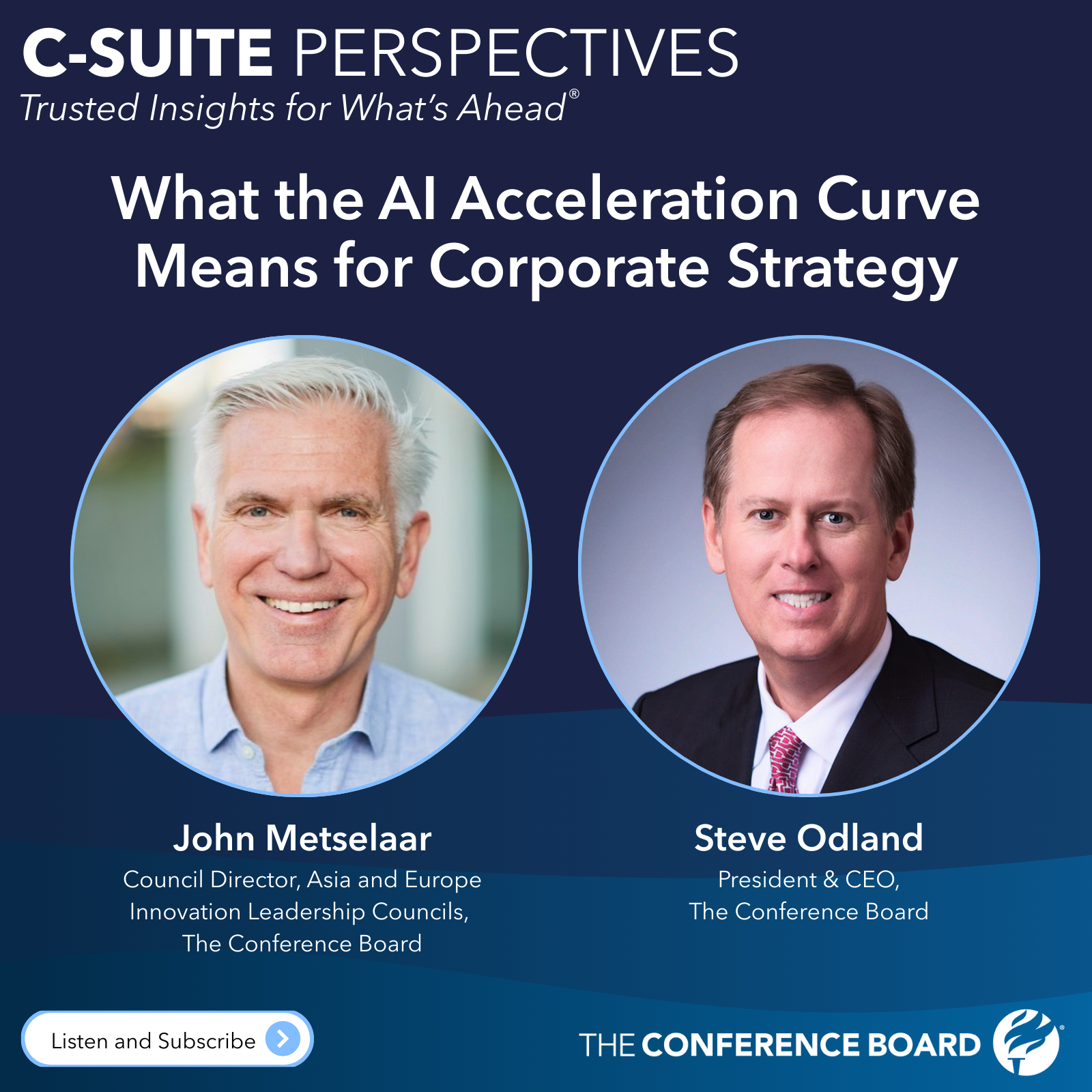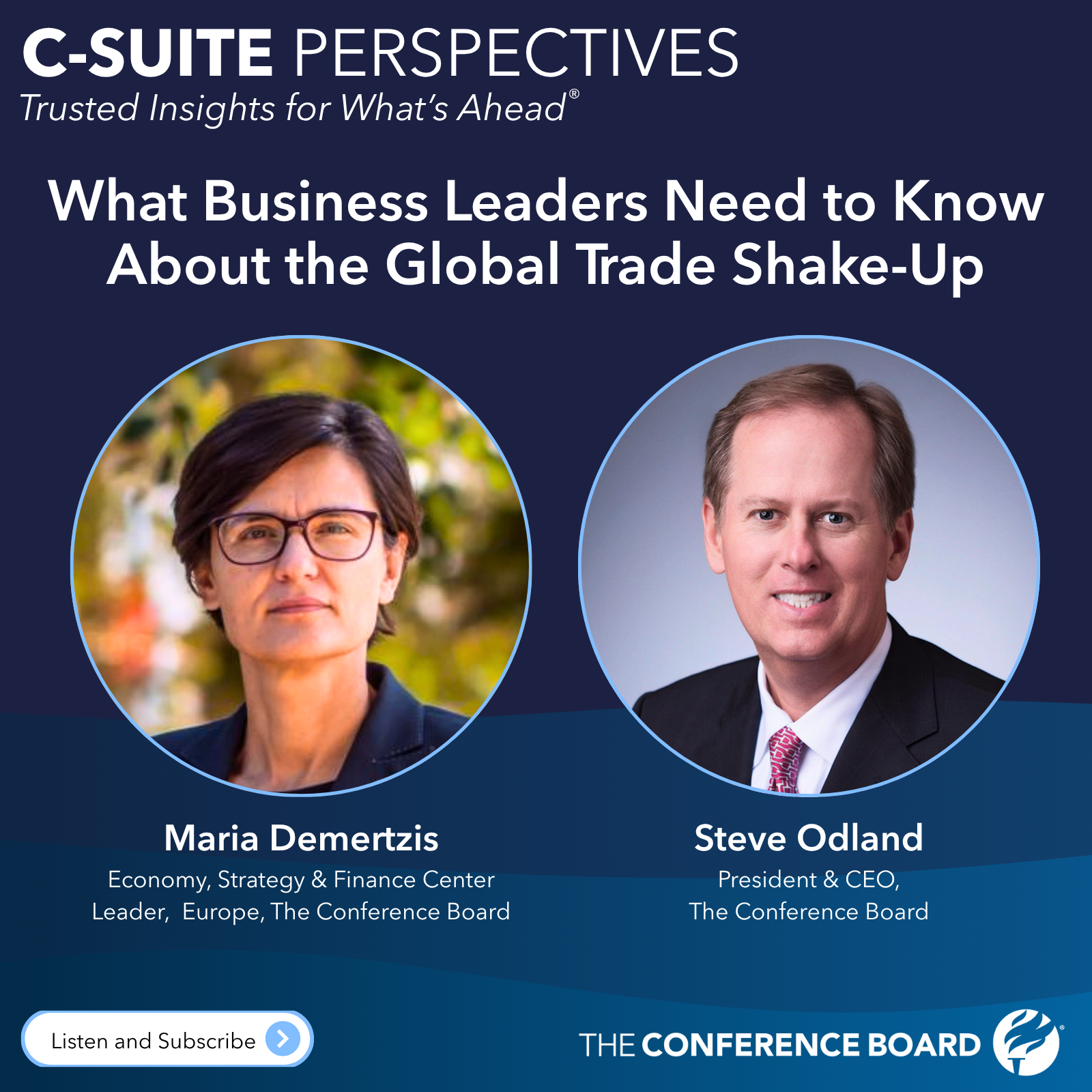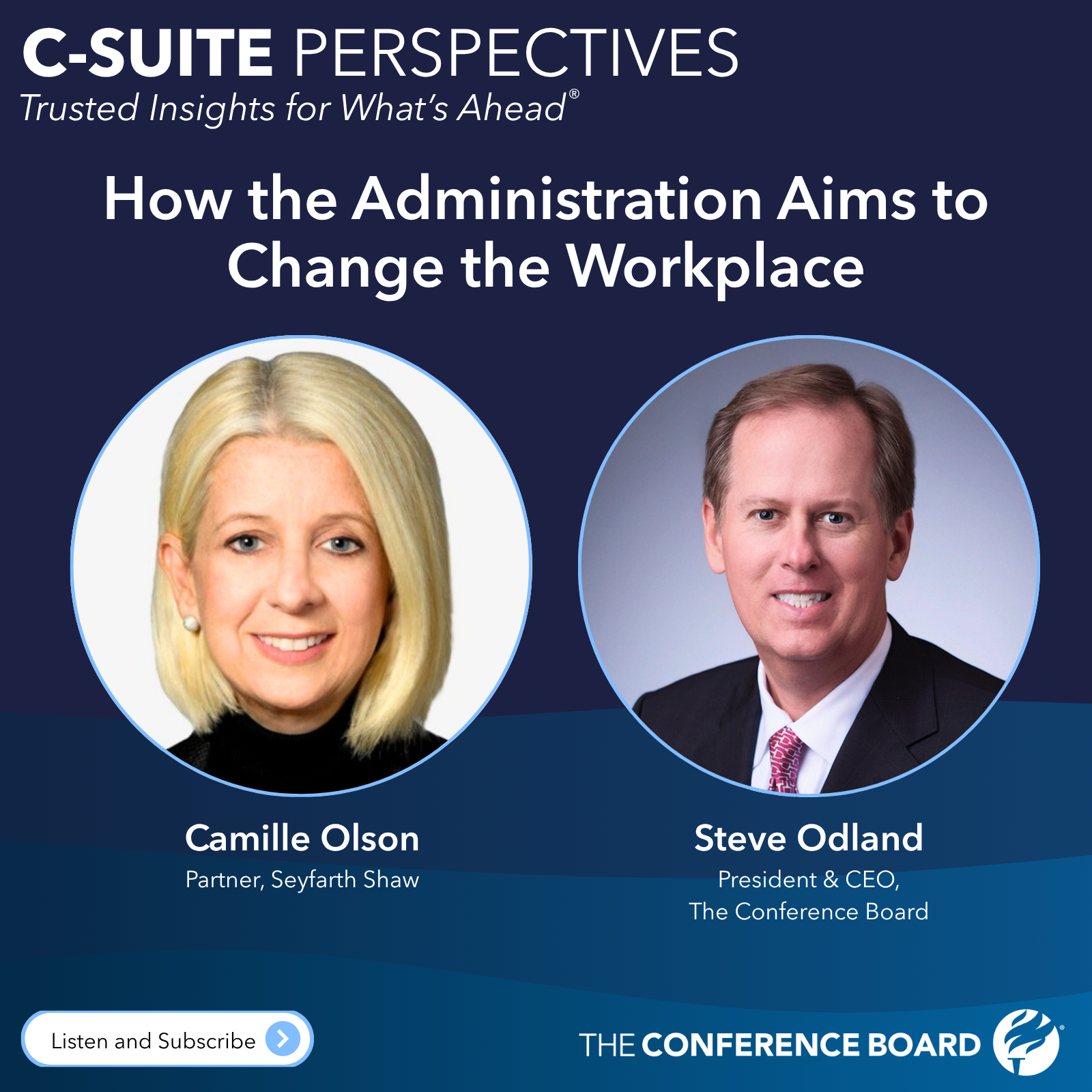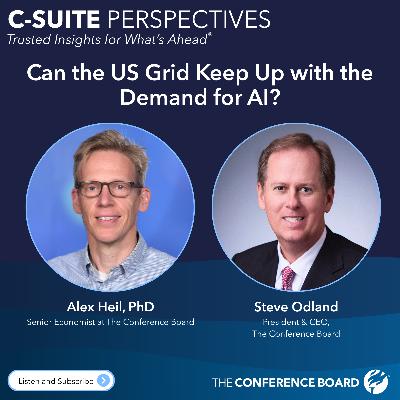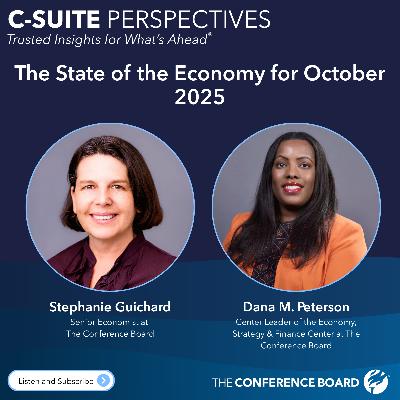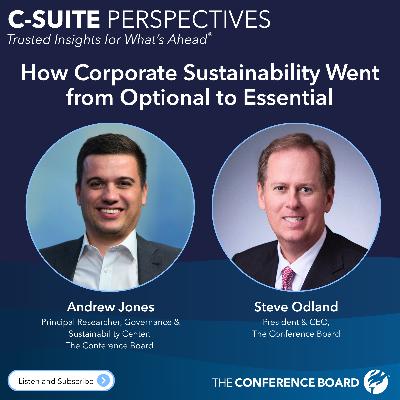Discover C-Suite Perspectives
C-Suite Perspectives

C-Suite Perspectives
Author: The Conference Board
Subscribed: 48Played: 882Subscribe
Share
Copyright © The Conference Board. All rights reserved.
Description
Welcome to C-Suite Perspectives, a podcast series by The Conference Board. Hosted by our President & CEO, Steve Odland, this weekly conversation will take an objective, data-driven look at a range of business topics aimed at executives. Listeners will come away with what The Conference Board does best: insights for what's ahead™.
319 Episodes
Reverse
Hosted by The Conference Board President & CEO, Steve Odland, C-Suite Perspectives takes an objective, data-driven look at a range of business topics aimed at senior executives. Listeners will come away with what The Conference Board does best: Insights for What’s Ahead™. In episode two, Steve sits down with Rebecca Ray, Executive Vice President and leader of the Human Capital Center at The Conference Board, to discuss a range of timely topics on the business community’s radar, including: Returning to the workplace: What will be the lasting effects of the pandemic on the workplace and the way we work? Addressing worker well-being: The events of 2020 have taken a toll on workers. What can organizations do to support their people? Developing leaders: How must leaders change as we move forward from the pandemic? And why is empathy key to effective leadership? Responding to social change issues: Are we in a permanently different era of corporate activism? What should leaders keep in mind when responding to social change issues? The growing importance of human capital management: Human capital management is expanding beyond human resources into the purview of boards and the C-suite. How can companies effectively oversee human capital management?
Learn why CEOs are much more optimistic about the economy in the new year. CEO confidence is up 9 points from Q4 2024, signaling a shift to confident optimism among CEOs. The Conference Board Measure of CEO Confidence™ reached 60 in Q1 2025—marking the highest reading in three years. What's driving these gains, and what does that mean for investment and capital spending? Join Steve Odland and guest Stephanie Guichard, senior economist for global indicators at The Conference Board, to learn about the biggest perceived risks, what's next for hiring, and why we're in an unusual period of high uncertainty and high CEO confidence. (01:57) CEO Confidence and Economic Outlook (05:18) Labor Market Insights (08:41) Impact of Policy and Uncertainty (11:51) Capital Spending and Investment Plans (14:33) Risks and Challenges Ahead For more from The Conference Board: CEO Confidence Increased Sharply in Q1 2025 C-Suite Outlook 2025: Seizing the Future The Conference Board Leading Economic Index® (LEI) for the US Declined in January
AT&T Chief Sustainability Officer Charlene Lake shares how the company adds value to society, communities, and the company all at once. AT&T—a 2025 recipient of the Corporate Responsibility Awards—wants to reduce its business customers' emissions by 1 gigaton by 2035—the equivalent of 1.6 billion cross-country flights. How is AT&T making sure its corporate responsibility effortsbenefitthe company and societyin the short and long term? Join Steve Odland and guest Charlene Lake, Chief Sustainability Officer and Senior Vice President, Corporate Responsibility at AT&T, to find out how the company designs corporate responsibility programs, why replacing copper wiring reduces energy use, and how to measure the success of these efforts. The 2025 Corporate Responsibility Awards, taking place on April 23, celebrates organizations that have gone beyond making public sustainability commitments to fully integrate sustainability into their business strategies, creating measurable, positive impacts on their organizations, stakeholders, society, and the environment. (00:51) Meet Charlene Lake: AT&T's Chief Sustainability Officer (02:07) Evolution of Corporate Responsibility (02:49) AT&T's Approach to Corporate Responsibility (03:15) Balancing Multiple Stakeholders (05:11) AT&T's Digital Divide and Environmental Goals (06:10) Integrating Corporate Responsibility into Business Strategy (17:25) Climate Resilience and Community Engagement (25:11) Leveraging AI and Technology for Sustainability
The ceasefire in Gaza hangs in the balance as President Donald Trump's proposal forces all sides to rethink the region's future. The conflict in Gaza has displaced 90% of the population, with President Donald Trump proposing to take over the region and resettle nearly 2 million Gazans elsewhere. What does Trump's proposal mean for negotiations, and how can all sides broker a lasting peace between the Palestinians and Israelis? Join Steve Odland and guest Dr. Lori Esposito Murray, senior fellow for national security and managing director of CEO programs at the Council on Foreign Relations and a CED trustee, to find out the current state of the pause in fighting, how the world reacted to Trump's proposal, and what obstacles remain to a permanent ceasefire. (00:41) Overview of Gaza's History (02:32) Hamas' Rise to Power (03:16) Current Governance and Control (06:20) The October 7th Attack (07:47) The Aftermath and Ceasefire (11:15) US Proposal for Gaza (13:55) Reactions to the Proposal (19:12) Challenges and Alternatives (28:47) Conclusion and Final Thoughts For more from The Conference Board: 2025 Outlook for Corporate Citizenship and Philanthropy Corporate Citizenship Responses to the Israel–Hamas Conflict: One Year Later The (Unfortunate) Need for a Corporate Playbook to Respond to War
No poll is perfect, but this year's pollsters did better than average in predicting the presidential race, especially in swing states. What lessons can we learn, and why do pollsters need to tell the right story, not just get the right numbers? Join Steve Odland and guest Clifford Young, President of Ipsos Public Affairs in the United States, to find out lessons learned from the 2024 cycle, the differences between public and private polling, and how pollsters find people to interview. (00:40) Accuracy of Election Polls (02:06) Expectations vs. Reality in Polling (03:29) Methodological Bias in Polling (07:28) Senate and House Race Polling (10:18) Impact of Third-Party Candidates (14:02) Private vs. Public Polling (22:15) Polling Methodologies and Voter Rolls (26:13) International Polling Perspectives For more from The Conference Board: US Election, Transition, and Early Actions of the New Administration Election Has No Effect on Fed Policy Now, But Possibly Later Impact of Delayed Vote Counts on Election Day
Consumption represents nearly 70% of US GDP, making trade policy integral to economic growth. But each US presidential candidate has expressed different trade policies that would affect American consumers in myriad ways. (00:39) Understanding Trade Policy (02:03) Evolution of Trade Agreements (04:58) Comparing Presidential Candidates on Trade (07:35) Tariffs and Their Implications (15:58) The Weaponization of Trade (16:23) China's Competitive Edge and Global Impact (20:21) Political and Security Concerns (24:31) Future Trade Policies and Implications Join Steve Odland and guest Susan Schwab, former US trade representative and a strategic advisor on public policy and trade at Mayer Brown, for the third installment in our series reviewing the US presidential candidates' positions on topics that relate directly to business. For more from The Conference Board: Election 2024: Trade, Taxes and Tariffs Election 2024: Debt, Deficits and Labor
With temperatures rising and countries trailing on net zero goals, how can the private and public sectors adapt? Global temperatures are well on their way to rising 2.6 degrees Celsius by 2100, and we're already seeing deleterious effects. How can humanity adapt to climate change—and what happens if we don't? Join Steve Odland and guest Alex Heil, Senior Economist at The Conference Board, to discuss the most pressing risks, where we stand on 2050 emissions goals, and how the private and public sectors should help our world adapt. (00:10) Understanding Climate Change (01:12) Current Climate Trends and Projections (03:48) Regional Impacts of Climate Change (07:40) Adaptation and Resilience (09:54) Global Efforts and Policies (13:54) Technological Solutions and Sequestration (20:42) Risk Assessment and Personal Actions (26:09) Role of Private and Public Sectors For more from The Conference Board: Hitting the Reset Button on ESG: Setting Strategy in a Time of Uncertainty Beyond Carbon: Why Methane Matters Carbon Emissions Continue to Rise Despite Massive Clean Energy Investments
The next five to 10 years could yield unprecedented, life-changing innovation in artificial intelligence (AI). Can industry and governments capitalize on this moment by finding the right balance of business innovation, AI regulation, and cybersecurity best practices? Join Dr. Lori Esposito Murray and guest Nikesh Arora, CEO of Palo Alto Networks, to find out why consistent AI regulation is important, how Arora built an innovation culture at Palo Alto, and why cybersecurity is more important than ever. (01:24) Nikesh's Leadership Journey (01:46) Key Pillars of Leadership (04:30) Navigating Uncertainty and AI (05:45) The Evolution of AI (12:59) Balancing Innovation and Regulation (15:28) Building an Innovative Culture (18:44) Future of Cybersecurity and Technology For more from The Conference Board: 2024 Distinguished Leadership Awards AI and Cybersecurity Rank Among Top 2024 Issues for CEOs Principles for AI Guardrails in the US: Safety, Security, and Innovation
The latest Conference Board Measure of CEO Confidence™ in collaboration with The Business Council reveals cautious optimism among US CEOs, with only 30% expecting a recession in the next 12 to 18 months. What do CEOs expect in terms of hiring and wages, and what are the biggest risks they see in the marketplace? Join Steve Odland and guest Dana Peterson, Chief Economist at The Conference Board, to find out why recession has faded as an immediate fear, whether CEOs plan to reduce headcount, and why they're especially worried about cyber risks right now. (00:28) Overview of the CEO Confidence Survey (01:13) Current CEO Sentiment and Market Conditions (02:44) CEO Predictions on Recession (05:10) Labor Market and Wage Trends (07:18) Industry-Specific Insights (13:45) Impact of Interest Rates on Housing (15:59) Tech Sector Dynamics (18:07) Key Risks Identified by CEOs For more from The Conference Board: The Conference Board Measure of CEO Confidence™ CEO Confidence Improves Globally, But Little Pain Relief Is Expected for Europe C-Suite Outlook 2024: Leading for Tomorrow
AI is driving the next wave of corporate reinvention, moving beyond efficiency toward creativity and strategic insight. For business leaders, the question is no longer whether to use AI but how to lead with it. In conversation with John Metselaar, The Conference Board CEO Steve Odland explores the new frontier of human-machine collaboration. The episode highlights how forward-looking leaders are using AI to improve decisions, fuel creativity, and drive growth. For more from The Conference Board: AI: The Next Transformation AI Leadership Summit Event Insights How Business Model Coherence Unlocks Value Amid the Digital Transformation
2026 is almost here. Find out what risks CEOs are prioritizing in the year ahead. CEOs have had to spend much of this year dealing with the fallout from tariffs and a government shutdown, but those challenges are far from resolved. What are the biggest risks CEOs are thinking about as the new year approaches? Join Steve Odland and guest David Young, president of the Committee for Economic Development, the public policy center of The Conference Board, to find out why tariffs will continue regardless of the Supreme Court decision, the increasing challenge of US fiscal debt and deficits, and how organizations can lean into AI. For more from The Conference Board: Tariff Tracker Global Gray Swans Tool What Business Leaders Need to Know About Global Trade
Consumer expectations for six months in the future continued to worsen in November, and confidence fell to its second-lowest level this year. Will holiday spending turn the tide on this rising pessimism? Join Dana M Peterson, Chief Economist and Center Leader of the Economy, Strategy & Finance Center, and Malala Lin, Economic Research Associate, both of The Conference Board, to find out how consumers are approaching holiday shopping this year, whether and how tariffs are factoring into their spending, and why health care costs are increasingly top of mind. For more from The Conference Board: US Consumer Confidence Forecast for the US Economy Global Economic Outlook
AI is redefining what effective leadership development looks like. Coaching, once limited to the few, can now reach the many, empowering managers and employees alike. Diana Scott welcomes Allan Schweyer, both of The Conference Board, to discuss how embedding AI coaches into daily workflows is redefining employee development, scaling mentorship, and enabling organizations to cultivate a more agile and emotionally intelligent workforce. For more from The Conference Board: A Coach for Every Worker: Scaling Access and Performance with AI Does AI Coaching Work? Activating the AI Coach: Effective Implementation Strategies for CHROs
Globalization is being rewritten as geopolitics, trade, and industrial policy collide. Shifting alliances are reshaping markets, supply chains, and the balance of economic power. In this episode, Steve Odland of The Conference Board, speaks with Maria Demertzis about what these shifts mean for corporate decision-makers. Together, they share how business leaders can adapt to rising uncertainty and build resilience in a fragmented world. For more from The Conference Board: Dutch Government Intervenes on Nexperia, Rewriting Europe's Geoeconomic Playbook Europe's Financial Independence Needs Derisking, Not Decoupling How Decision-Makers Can Prepare for Fundamental Uncertainty in Today's World
Companies in the S&P 500 are increasingly disclosing AI-related risks. Find out what this means for C-Suite leaders and boards. More than 70% of the S&P 500 disclosed material AI risks in 2025, up from only 12% in 2023. What are the biggest AI-related risks for these companies, and how can they integrate AI into governance and risk frameworks? Join Steve Odland and guest Andrew Jones, principal researcher at the Governance & Sustainability Center of The Conference Board, to discover why AI disclosures have soared since 2023, the challenges of divergent regulations in the EU and US, and why AI further complicates cybersecurity. For more from The Conference Board: AI Risk Disclosures in the S&P 500: Reputation, Cybersecurity, and Regulation How Should Companies Approach Reputation Building in the AI Era? A Coach for Every Worker: Scaling Access and Performance with AI
The modern workplace is being reshaped by a sweeping "whole-of-government" approach to policy, enforcement, and regulation. From diversity and inclusion to AI and immigration, the Administration's actions are influencing how both federal and private employers manage compliance, talent, and organizational risk. In this episode, Steve Odland speaks with Camille Olson, partner at Seyfarth, about what this evolving landscape means for business leaders. They explore how executive orders, agency directives, and litigation trends are redefining the boundaries between public policy and corporate governance. For more on this topic: To H-1B or Not to H-1B: That Is the Policy Question Is ICE Coming for Your Workers? No, DEI Is Not Banned: A C-Suite Guide to Navigating the Legal Landscape in 2025 Workplace Governance Under the Trump Administration (Seyfarth)
Find out why a 1-2% increase in annual electricity demand could create stress to the US electrical grid. US electricity demand has been largely flat for 20 years, thanks to efficiency gains. But with rising power demand from AI, electric vehicles, and other forms of electrification, how can the US grid keep up? Join Steve Odland and guest Alex Heil, PhD, senior economist at the Economy, Strategy & Finance Center of The Conference Board, to find out the current pressures on power generation and distribution, what kinds of investment are required, and how higher power demand affects US businesses and consumers. For more from The Conference Board: Power Playbook: How US Businesses Can Prepare For Electricity Price Pressures US Power Surge: How Businesses Can Prepare for Electricity Demand Spikes from AI Plugged In or Power Outage? Corporate Risk in US Grid Capacity
What does the latest Consumer Confidence Index reveal about the economy's true pulse amid a prolonged government shutdown? In this episode, host Dana M. Peterson, Chief Economist and Center Leader of the Economy, Strategy & Finance Center, talks with Stephanie Guichard, Senior Economist of Global Indicators, both of The Conference Board, about the latest Consumer Confidence Index results and the ongoing federal government shutdown. They discuss how Americans are feeling about the economy, inflation, and the job market; early signs for the 2025 holiday shopping season; and what the shutdown means for growth, data, and consumers. Topics covered: Why consumer confidence is holding steady despite uncertainty Shifts in inflation expectations and buying plans Insights on holiday spending and tariff impacts The shutdown's effects on data, jobs, and GDP What to watch for as policymakers debate next steps For more from The Conference Board: US Consumer Confidence Forecast for the US Economy Global Economic Outlook
"This is a self-inflicted wound on our economy," says former Congressman Ron Klein. In this episode of C-Suite Perspectives, Steve Odland, CEO of The Conference Board, sits down with Klein to unpack the ongoing US government shutdown: what it really means, who it affects, and how it might end. Together, they explore the technical mechanics behind a shutdown, the political dynamics fueling it, and the ripple effects across the economy and private sector. Executives should monitor the shutdown's downstream effects on consumer confidence, supply chains, and federal partnerships. Klein underscores that resolution will come—but the longer the impasse, the broader the economic and social toll. For more from The Conference Board: US Consumer Confidence Navigating Washington
In just a few decades, corporate sustainability has grown into a core corporate function, particularly at publicly traded companies. What is the state of corporate sustainability in 2025, and how will it evolve in the coming decade? Join Steve Odland and guest Andrew Jones, principal researcher at The Conference Board's Governance & Sustainability Center, to find out what "corporate sustainability" means, why most companies are embracing a hybrid model, and where sustainability leaders see the function evolving next. For more from The Conference Board: Structuring Corporate Sustainability for Business Advantage Sustainability Under Scrutiny: Corporate ESG in an Uncertain Policy Environment Survey: 80% of Corporations Are Reworking ESG Strategies Amid Policy Shifts









